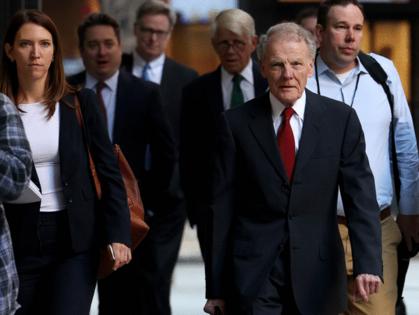Former ex-Illinois Speaker Madigan aide testifies contract for Eddie Acevedo was 'kind of a joke'
Published in News & Features
CHICAGO — A former top aide to ex-Speaker Michael Madigan on Monday continued his testimony as a government witness against his old boss – but for much of his cross-examination sounded a lot like a defense witness, bolstering their portrayal of Madigan’s operation as hardworking, constituent-focused and straightforward.
Thomas Cullen, who worked for the Speaker’s office in the 1990s and maintained close ties with Madigan staffers after becoming a lobbyist, began his cross-examination from Madigan’s attorneys by confirming that Madigan’s office followed rigorous rules separating political work from government work. And he testified that he did political work out of a love of the game – not because of political pressure from the Speaker.
“Would you applaud the job (Madigan) did managing the Democratic caucus?” Madigan attorney Todd Pugh asked.
“I would,” Cullen said.
“Did you believe he worked harder than anyone you’d ever seen?” Pugh asked a few moments later.
“Yes,” Cullen said.
“Did you believe he earned his success by working harder than anybody?” Pugh asked, and prosecutors successfully objected.
Madigan, 82, of Chicago, who served for decades as speaker of the Illinois House and the head of the state Democratic Party, faces racketeering charges alleging he ran his state and political operations like a criminal enterprise, including accepting bribes from ComEd and AT&T in the form of no-work contracts granted to their political allies.
Both Madigan and his co-defendant Michael McClain, 77, a former ComEd contract lobbyist from downstate Quincy, have pleaded not guilty and denied wrongdoing.
Cullen, who worked as a contract lobbyist for AT&T, testified last week that he agreed to be a pass-through for AT&T to pay former state Rep. Edward Acevedo, a Chicago Democrat, $2,500 per month, under a do-nothing subcontract.
Cullen testified Monday that he never saw any work from Acevedo, and that a report Acevedo was assigned to write became an inside joke between him and the AT&T brass.
Why?
“Because it was not viewed as some report that was worth anything really,” Cullen said. “It was just kind of a joke”
Acevedo himself is scheduled to testify later Monday. Prosecutors could rest their case in chief as early as Tuesday.
McClain’s attorneys used their cross-examination to emphasize that currying favor and trying to earn goodwill with an elected official is a normal part of lobbying – and tried to take the sting out of AT&T executives’ emails that showed a fixation on getting credit from Madigan and McClain for paying Acevedo.
“If you’re responsive to a request from an elected official it’s important for you, as a lobbyist, to make sure that the elected official knows you have indeed responded to their requests?” McClain attorney Patrick Cotter asked, and Cullen agreed.
“Getting credit is a totally important and normal part of your lobbying?” Cotter asked, and again, Cullen agreed.
The fine line between bribery and normal lobbying activity will surely be a focus of closing arguments next month. McClain’s attorneys in particular are focusing on an argument that there was never any explicit exchange between the defendants and the utility companies for favorable legislation.
In his cross, Pugh also asked Cullen about his motivations to pay $1,000 a month to 13th Ward political aide Kevin Quinn, who had been ousted by Madigan in 2018 after he was accused of misconduct.
To avoid prejudicing the jury, the judge has barred specific evidence that Quinn had been accused of harassment by campaign worker Alaina Hampton.
But the jury has heard evidence that McClain arranged for Cullen and a handful of other Madigan loyalists to funnel money to Quinn as a bridge until the speaker could find him a permanent job. Prosecutors have also heard a wiretapped call where McClain detailed the plan to Madigan, who said he “oughta stay out of it.”
In his cross examination, Pugh painted it all as nothing more than an effort to help a friend in need, asking Cullen, didn’t you agree to help Quinn after McClain told you he’d been drinking a lot and he had kids he needed to care for?
“Yes, Cullen said.
“And you wanted to give him an opportunity to stay busy so maybe he wouldn’t be boozing as much?” Pugh asked.
“Fair,” Cullen replied.
McClain’s attorney, Patrick Cotter, followed that same theme in his cross examination, asking Cullen: “You were just trying to help a person you knew who was in crisis?”
“Correct,” Cullen said.
After the jury left for lunch, Assistant U.S. Attorney Amarjeet Bhachu accused the defense of trying to insinuate that Quinn was “just a poor guy with kids when we all jolly well know” he’d been accused by a woman of sexual harassment.
Pugh replied it was prosecutors who wanted to put this Kevin Quinn evidence in so badly, and that the judge rightly excluded anything about sexual harassment.
Cotter, meanwhile, called out Bhachu for saying “we all jolly well know” that Quinn was sexually harassing a woman. “We don’t all jolly well know that” Cotter said, noting they were just allegations and there was never a hearing or ruling determining their truth.
Blakey said the jury has heard evidence Quinn engaged in misconduct and was fired for it, and that’s enough. “The details of sexual nature and all that I don’t think that becomes admissible,” he said.
_____
©2024 Chicago Tribune. Visit chicagotribune.com. Distributed by Tribune Content Agency, LLC.







Comments